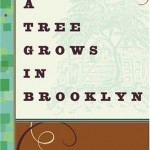
Perhaps every insatiable reader has a book so thoroughly imprinted at a vulnerable age, that they carry those characters like family of the heart forever. Some marked me for horror. IN COLD BLOOD assured I’d never stay alone in a country house. Others taught me about the awful mixes of fear, revulsion, and sadness we can barely tolerate, like OUR GUYS, by Bernard Lefkowitz, a book which assured I’d look at any boy my daughters dated with more judgment than I wanted.
And some taught me faith in the future.
A TREE GROWS IN BROOKLYN by Betty Smith was the only bible I ever owned, my personal talisman of hopefulness. Perhaps it was partially because, though in different times, like Francie, I grew up in Brooklyn and I missed my father. He, like Francie’s, ran from by what we now call self-medicating (and what Francie’s mother and mine, called nothing, because who talked about it in Brooklyn?) And then they escaped forever by dying young.
Like Francie, I’d experienced the horror of old men liking young girls, of having an aunt I worshipped, and a school I hated. Each time I read A TREE GROWS IN BROOKLYN I was struck anew by how this author knew so much and dared to write it.
That’s the beauty of books. They don’t just transport, they heal, they teach, and they soothe. On the loneliest of days, they ask no more than picking them up. In the worst of times, they stand by. And those old friends—like Francie Nolan—they don’t only offer a ‘you are not alone,’ they provide you with the promise that there will be a way out. Maybe not the happiest ending in the world, but at least you knew you could end strong at the broken places.
Thank you, Francie Nolan.
Bless you, Betty Smith.